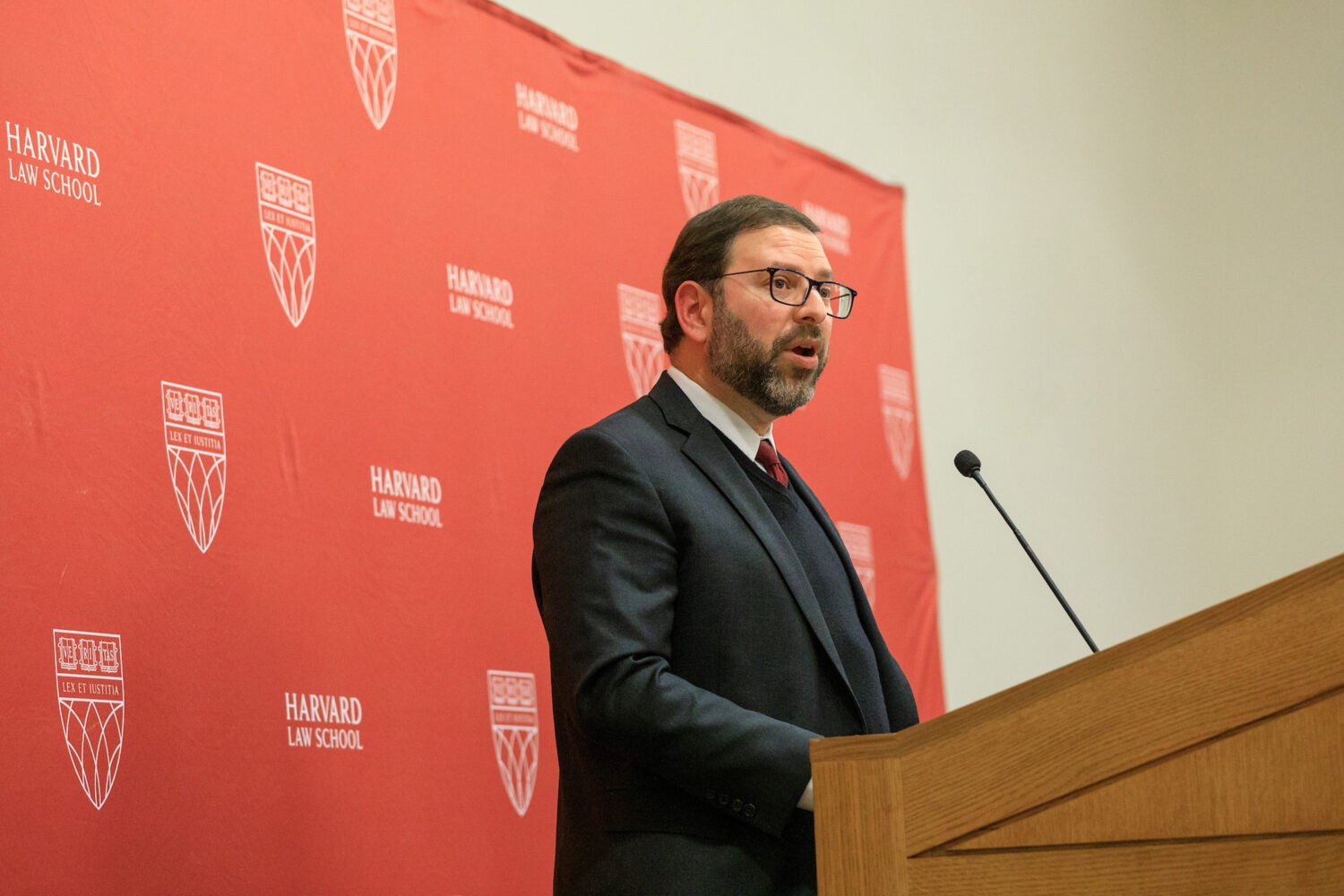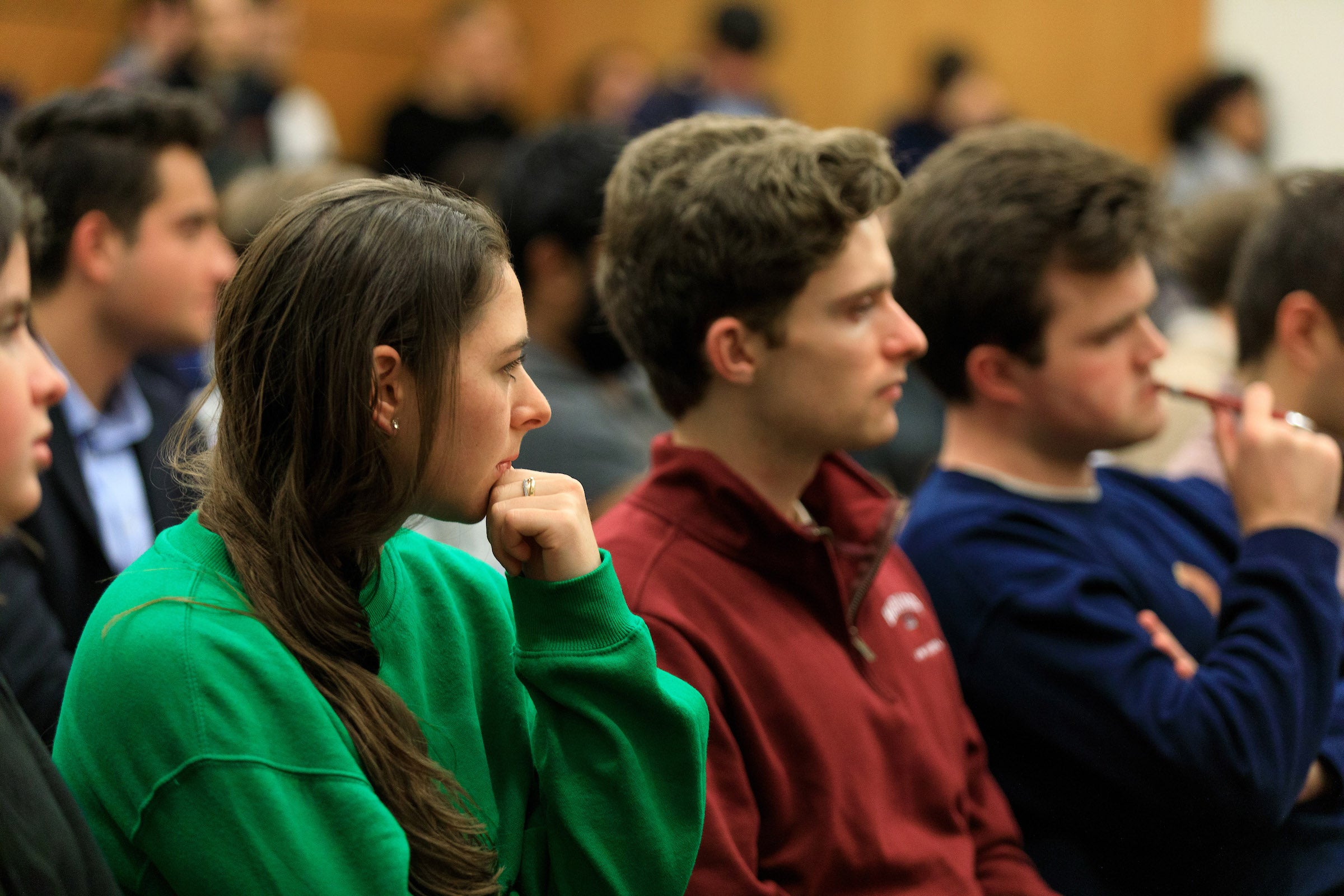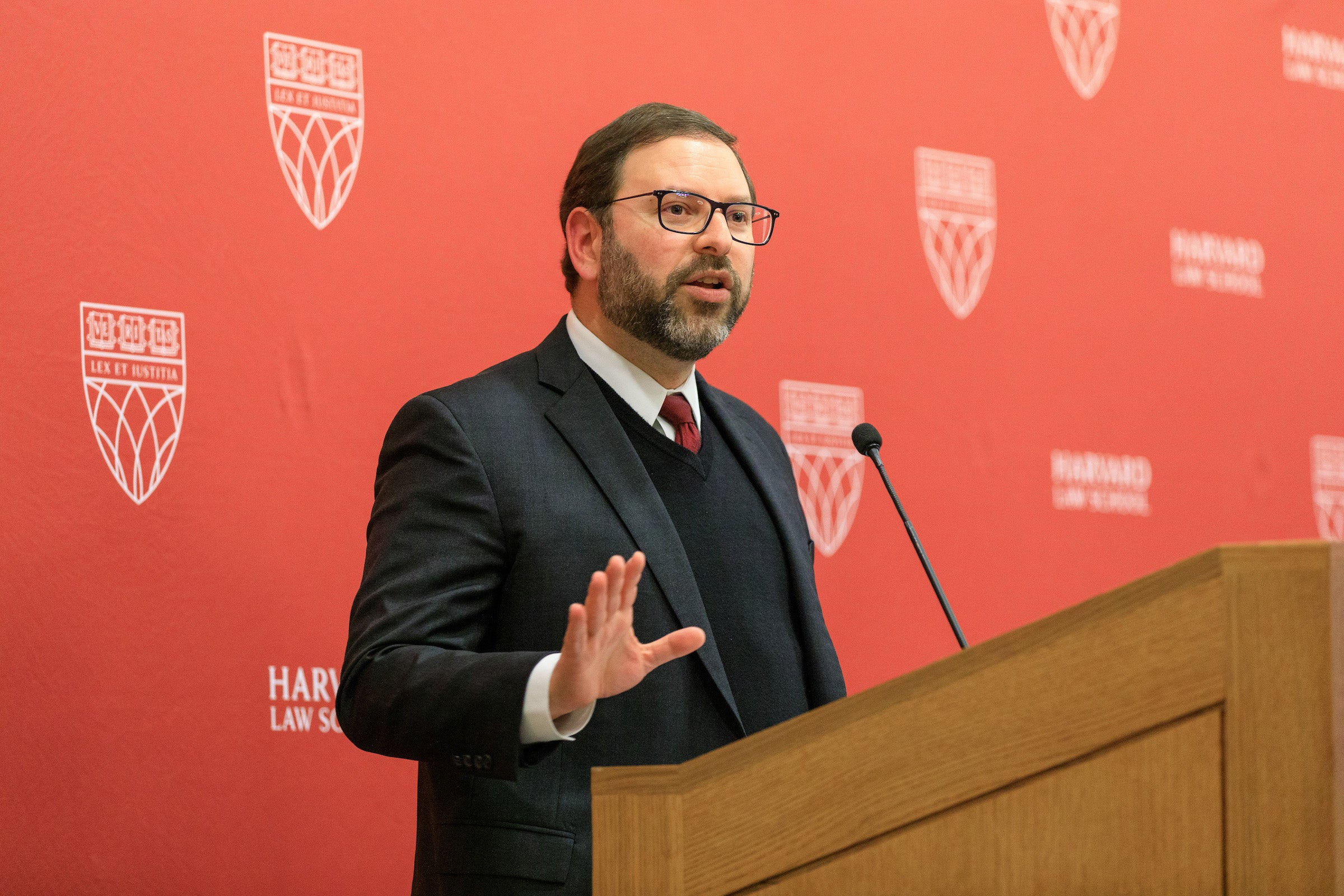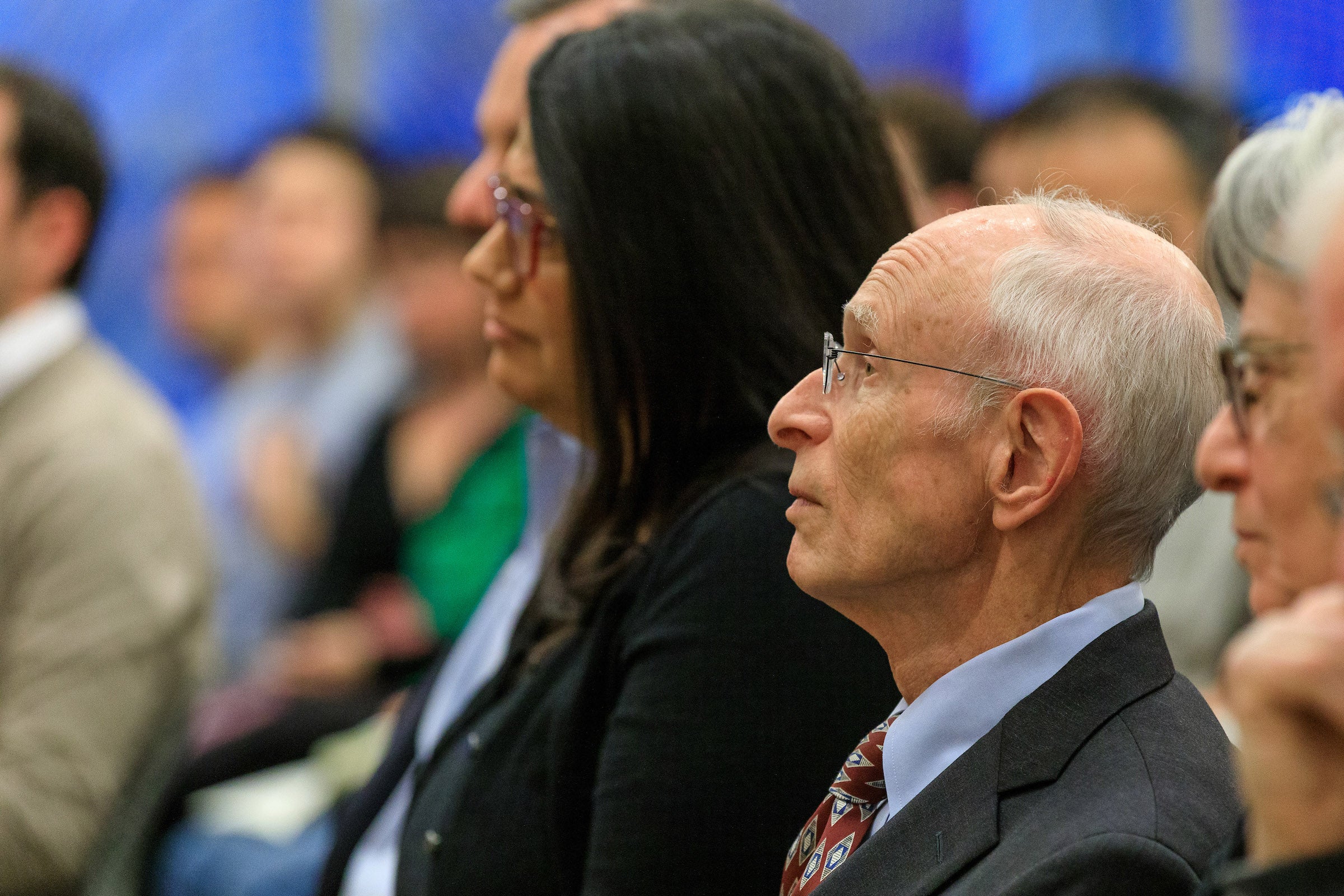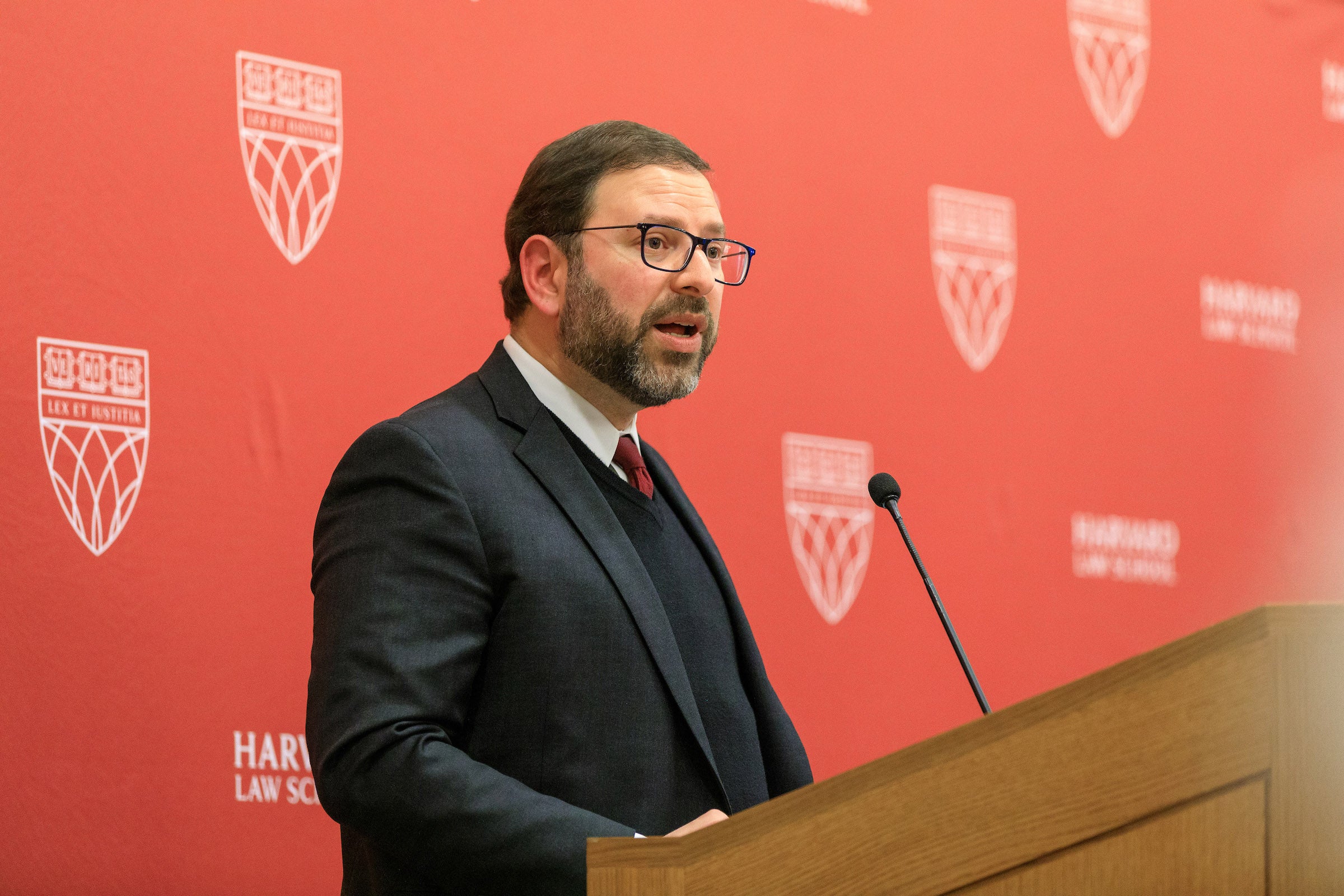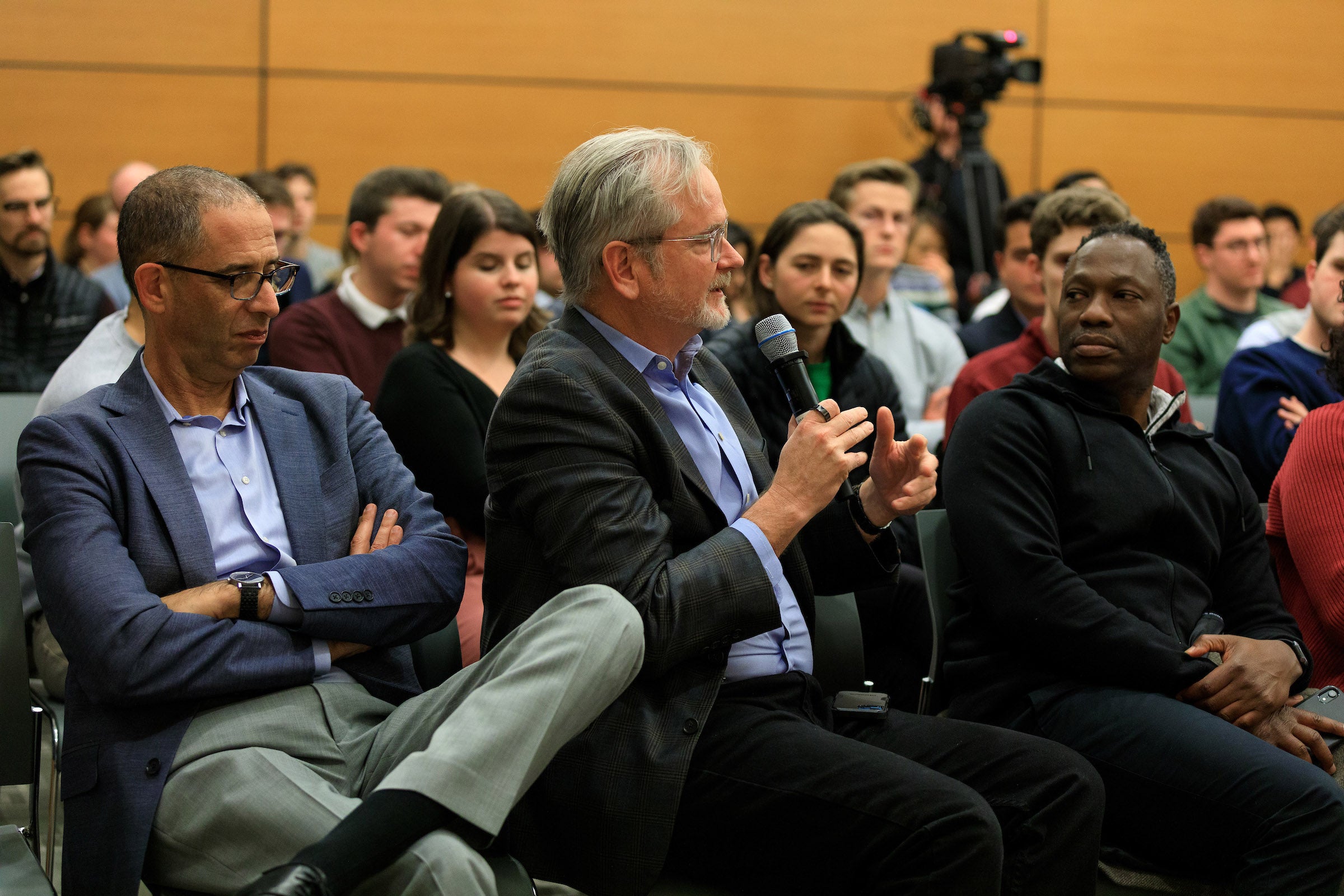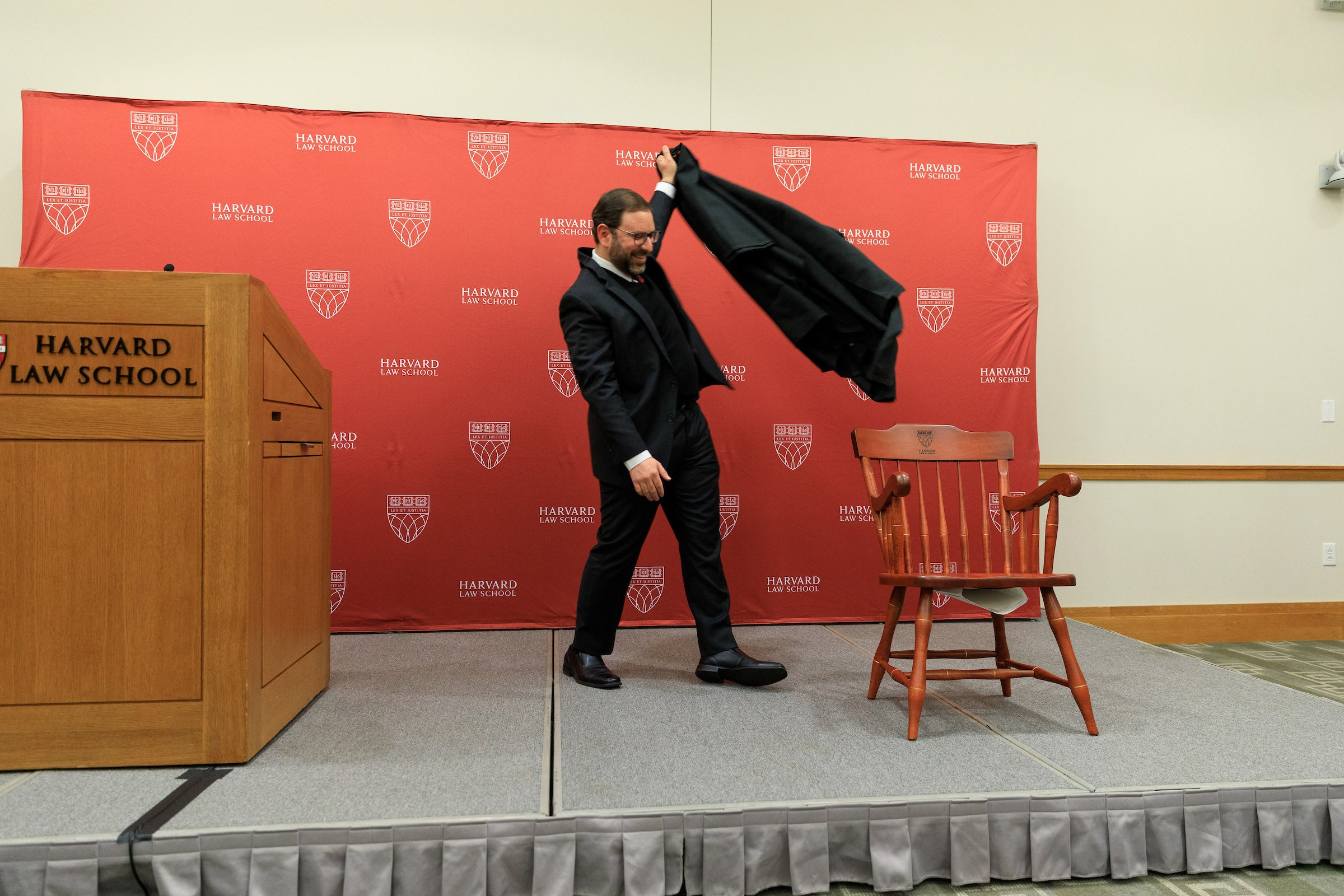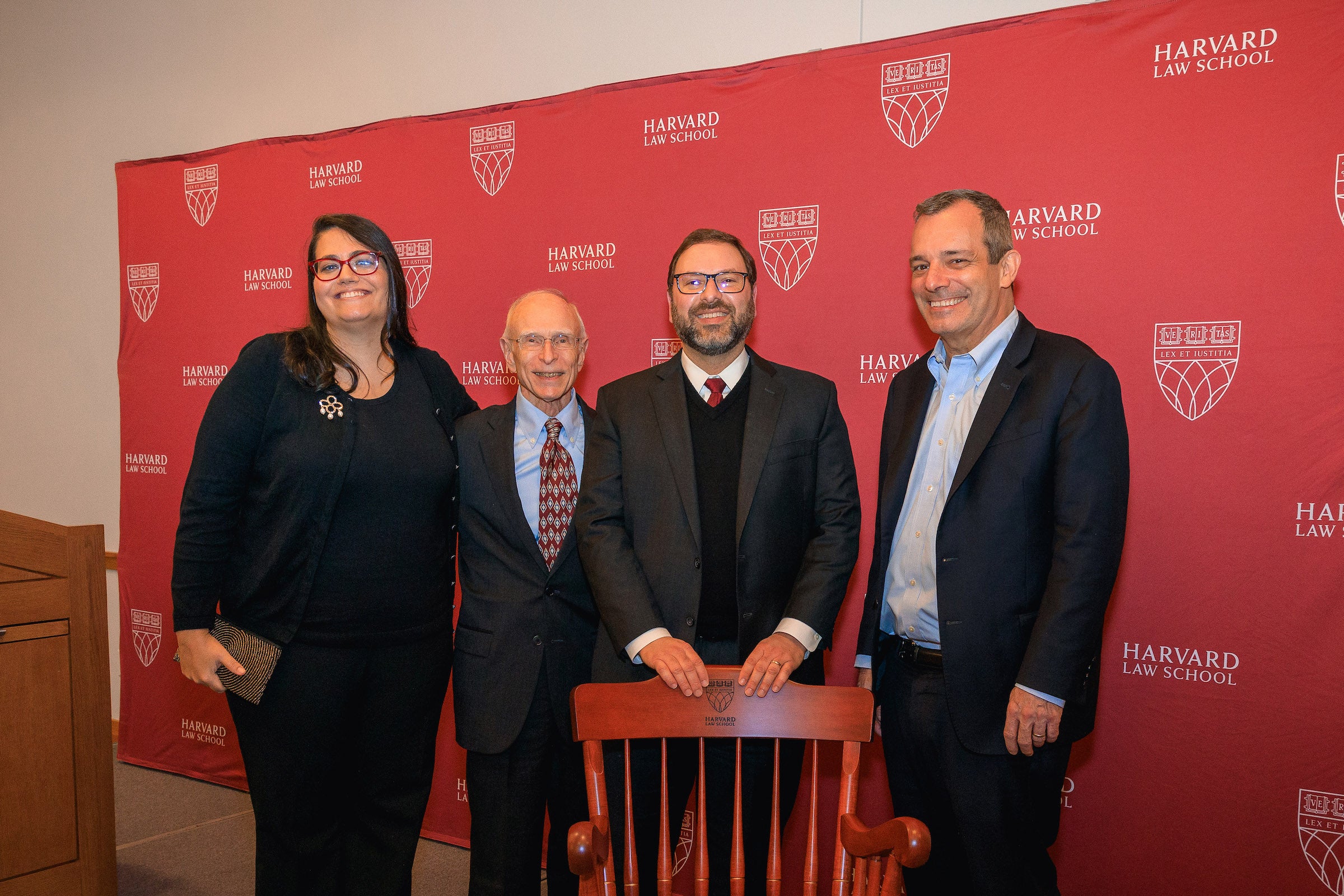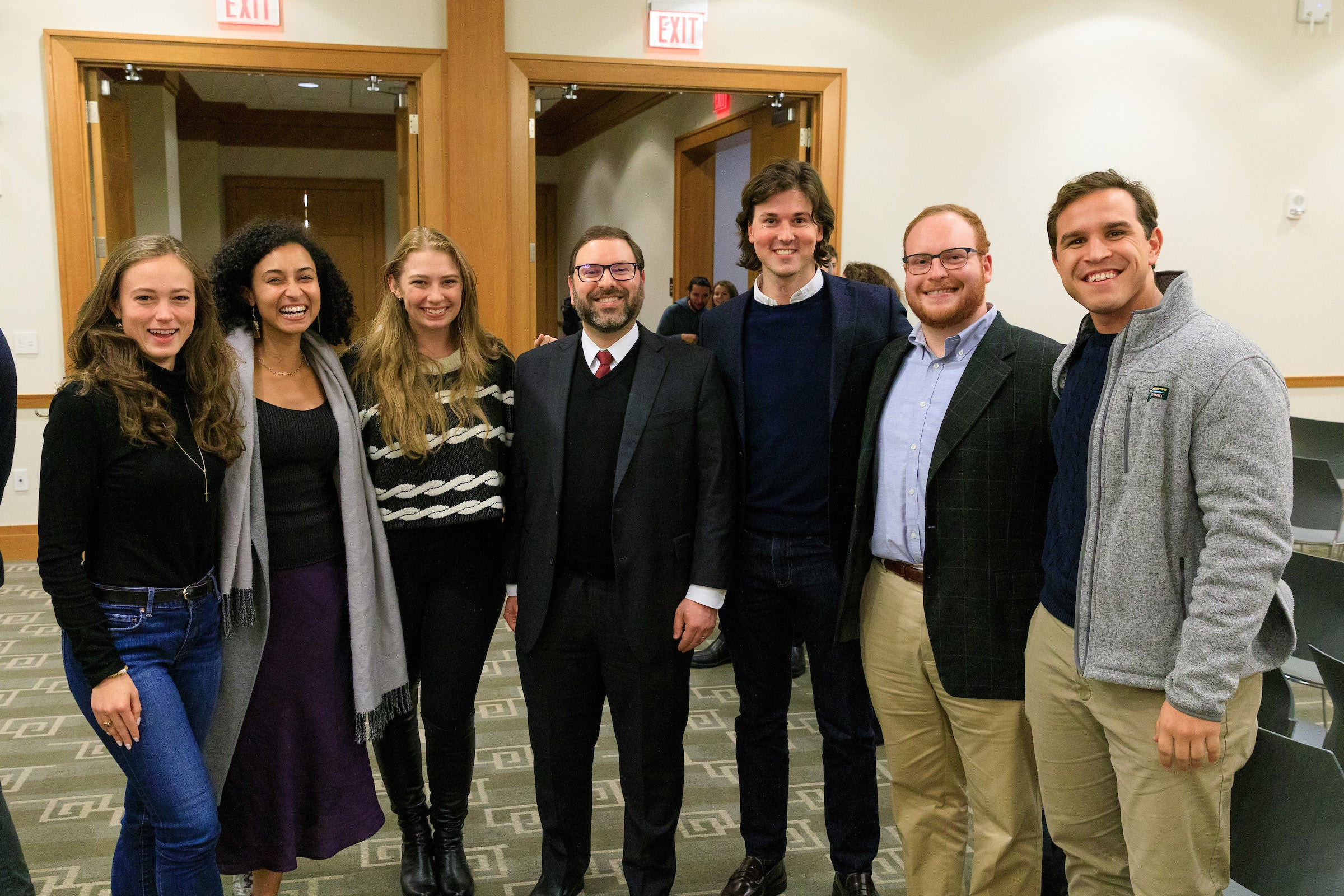Can law exist without a lawmaker?
According to Harvard Law Professor Stephen Sachs, the answer is yes. The written law created by legislators, he argued during a recent talk, has long rested on a system of traditional and enduring rules that Americans inherited at the nation’s founding — including rights secured, but not created, by the United States Constitution.
But this form of law, known as general law, was purportedly abandoned by the Supreme Court in Erie Railroad Co. v. Tompkins, which Sachs called the “the most important case that no one who isn’t a lawyer has ever heard of.”
Over the course of nearly an hour, Sachs explained why he believes the Depression-era justices erred, discussed the possibility that general law might be returned to its “rightful place,” and explored what that might mean for the U.S. legal system. His remarks came in a lecture titled “Life After Erie,” which he delivered at Harvard Law School on November 1, during an event celebrating his appointment as the inaugural Antonin Scalia Professor of Law.
Admitting that some in the audience might be “mystified” by the title of his talk, Sachs summarized the landmark 1938 Supreme Court case at the heart of his argument. Erie involved a Pennsylvania man, Harry Tompkins, who was allegedly struck and injured by a passing train while walking near the tracks late at night. Tompkins sued in a federal court in New York, where the Erie Railroad was headquartered. The company argued that because the accident happened in Pennsylvania, the case should be decided as the Pennsylvania courts would decide it. After lower courts relied on general law to find for Tompkins, the railroad appealed.
In its 6-2 ruling for the Erie Railroad, the Supreme Court said that in ‘diversity’ cases — cases involving parties from different states — federal courts must rely not only on the law of the relevant state, but on that law as interpreted by that state’s courts. In doing so, the justices overturned a precedent set in 1842 in Swift v. Tyson and sought to banish general law from the legal lexicon. Writing for the majority, Justice Louis Brandeis explained that, “in applying the doctrine [of Swift] this Court and the lower courts have invaded rights which in our opinion are reserved by the Constitution to the several States.”
“Viewed narrowly,” said Sachs, the Erie decision “holds that a federal court, when deciding issues subject to state law, has to defer to the opinions of state courts.” But viewed more broadly, Sachs argued, the decision has had a much larger and more deleterious impact than that narrow view implies.
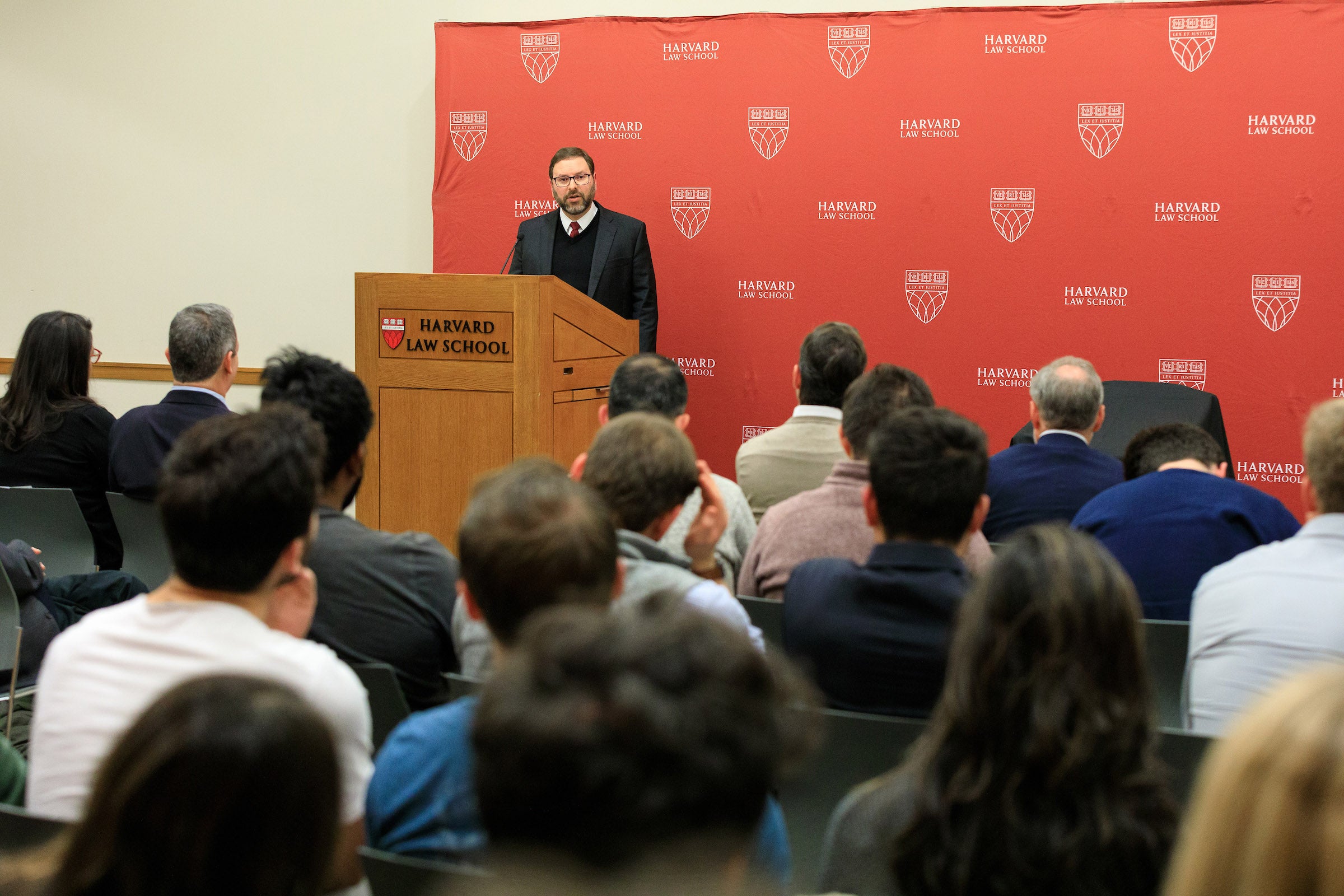
While unfamiliar to many today, the term general law included a “variety of entirely familiar bodies of law,” Sachs said, ranging from English common law to the laws of war. “General law wasn’t supreme law of the land … but it was law of the land, which both state and federal governments could employ when no other law controlled.” Its attempted abolition in the Erie case, he said, has “left us unable to understand basic aspects of American jurisprudence.”
According to Justice Felix Frankfurter’s majority opinion in the 1945 case Guaranty Trust Co. v. York, Sachs noted, “Erie overruled not just a past line of cases, but ‘a particular way of looking at law.’ Erie rejected a category of law, sometimes called ‘general common law’ or just ‘general law,’ that was at one time fundamental to our federal system.”
Worse still, Sachs contended, “Erie destroyed this part of American law for surprisingly bad reasons.” The Court, he said, “reasoned that there simply can be no law without a legislator; that just as statutory rules are made by legislatures, common law rules are necessarily made by judges; that it is judges’ job to make new rules whether the federal or state constitutions give them that power; that, in short, the common law necessarily is whatever judges say it is.”
Noah Webster and rules without rule makers
Sachs compared the idea that laws cannot exist unless formulated by lawmakers to the evolution of English grammar and spelling conventions, rules that he said have evolved without the need for rulemakers.
“The idea that there can be no laws without lawmakers or rules without rulemakers simply collapses upon inspection,” he argued. “When it comes to rules of grammar or spelling, no one thinks that rules always require rulemakers.”
Take the case of the early 19th century lexicographer Noah Webster. While Americans have abided by his famous decision to part ways with conventional British spellings of words like “behaviour” by removing “fancy-pants British vowels,” Sachs said, they have rejected some of his other innovations. Webster’s proposal to remove the ‘a’ in ‘feather,’ for instance, didn’t stick. That is because, Sachs explained, “there is no rule of American English that says that Noah Webster has power over proper spelling, the way that, arguably, the Académie Française has power over proper French.”
“To say that rules require rulemakers or that laws require lawmakers is to ignore centuries of customs and customary law from across the globe, all of which were formed through human action, obviously, but not necessarily through human design.”
Sachs argued that the same is true of unwritten general common law, which, like English, exists and is recognized by practitioners, despite not having been created by legislators or courts.
“In this regard, there is no real difference between a customary spelling rule like ‘i before e except after c’ and a customary legal rule,” because, he added, a “legal system can regard as law what is customarily accepted as law by lawyers and legal experts, just as language can regard as proper grammar what is customarily accepted as proper grammar by third grade English teachers and grammar snoots.”
“To say that rules require rulemakers or that laws require lawmakers is to ignore centuries of customs and customary law from across the globe, all of which were formed through human action, obviously, but not necessarily through human design,” Sachs said.
Envisioning a post-Erie world
Turning to “the happy and glorious day when Erie has been overturned,” Sachs laid out a series of possible implications. He first cautioned that he was making no prediction that Erie would be overruled anytime soon. While “some legal seismologists have discerned rumblings in that direction,” he said, “we have no guarantee that courts will get things right. The arc of jurisprudence does not always bend toward intellectual coherence.”
At the state level, overturning the Supreme Court’s decision in Erie would have little impact, Sachs argued. But at the federal level, it would have profound effects. Among other outcomes, he argued, reversing the precedent in Erie would mean the end of ‘federal common law,’ a category of jurisprudence he said the Court had “invented” in another case it decided on the same day it abolished general law.
Reinstating the general law as it was recognized prior to Erie, he argued, would also help clarify the rationale underpinning the substantive canons of statutory interpretation — which two other Harvard Law scholars have described as “judicial presumption[s] … in favor of or against a particular substantive outcome.” Sachs explained that, viewed through a lens untinted by Erie, the “substantive canons are just common law rules for interpreting statutes.”
In another example, Sachs argued that general law “can explain how our law interacts with customary international law,” an area of interpretation he described as having been “an intellectual battleground for decades.” The answer, he said, is that “customary international law is general law. It applies of its own force throughout the nation, but it does not preempt contrary state or federal law.”
The general law would again be understood, he said, as it was when the United States was created, to be the source of longstanding unenumerated rights, protected but not created by the nation’s founding charter. Should general law be reinstated, Sachs argued, “[t]his picture of the Constitution as securing rights rather than conferring them, and looking to preexisting law for their content, would produce a new and doubtless very different jurisprudence of individual rights.”
“This picture of the Constitution as securing rights rather than conferring them, and looking to preexisting law for their content, would produce a new and doubtless very different jurisprudence of individual rights.”
“The last and most fundamental change of all from abolishing Erie may be in our attitudes towards common law judging,” he said. It would relieve judges of the presumption that they may make law in any case where no written laws exist, which he explained is in some states the exclusive province of the legislature.
But how likely is it that the Supreme Court will overrule its precedent in Erie and reinstate general law after an 85-year interregnum? Is the situation “simply too far gone” to be retrieved? Sachs ended his talk by arguing why a return to a pre-Erie world is not impossible.
“To begin with,” he said to laughter, “I note that there is no ‘Simply Too Far Gone Clause’ of Article Five.” In addition, he said, today’s justices are free to correct mistakes made by their predecessors. “When the Court is faced with this kind of demonstrable error,” he said, “traditional doctrines of stare decisis [deference to past precedents] pose no bar to beginning the work of repair.”
While the process of readapting to general law would take time, Sachs argued that federal judges could begin departing from Erie’s theory by simply refusing to make new law, applying preexisting law as it stands.
“In other words, a federal court can place authority where it belongs, in the people of the United States and of each state, which have their own constitutions, statutes, and customs,” he said, “and not, or not necessarily or automatically, in the judges who staff their courts,”.
“As Justice Frankfurter once put it, ‘wisdom too often never comes, and so one ought not reject it merely because it comes too late,’” Sachs concluded. “When we ask ‘when should we start overrule Erie?,’ the only answer is that now is an acceptable time.”
Want to stay up to date with Harvard Law Today? Sign up for our weekly newsletter.
